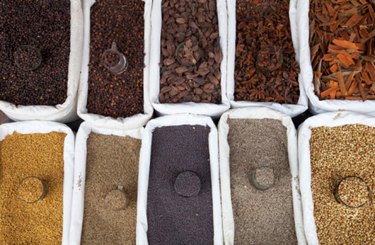Things You'll Need
Measuring spoons
Dry measuring cups
Butter knife or spatula
Small bowl
Mixing bowl
Funnel
Pencil

Measuring ingredients effectively is the first step toward becoming a good cook. Too little or too much of any herb or spice can ruin a dish. Tossing spices into a dish and ending up with a gourmet meal seems nearly effortless for television chefs, who have lots of experience that novice cooks do not and can "eye" their flavorings. At home, until you gain experience, stick with tried-and-true measuring tools and guidelines for using them successfully.
Measuring Spoons
Step 1
Select the correct spoon from your set based on the recipe's instructions. A standard set of measuring spoons includes one tablespoon, one teaspoon, one 1/2 teaspoon, one 1/4 teaspoon and one 1/8 teaspoon. Double-check the markings on the handle, making sure you have the correct one.
Video of the Day
Step 2
Scoop out the spice using the measuring spoon. If the spoon doesn't fit in the jar, pour some spices into a small bowl and scoop them up. Level the mound using a butter knife scraped across the top. Put this in your mixing bowl.
Step 3
Return any excess spice to the jar carefully using a funnel, then cap the jar. Measure the next item in your recipe, following the same process for other spices listed. Mark off each ingredient used after you put it in the bowl using a light pencil mark (you can erase those later). This insures you have everything required before mixing and cooking.
Hand Measuring and Adjustments
Step 1
Practice hand measuring after you work with measuring spoons for several recipes from beginning to end. Older recipe books may not include specific teaspoon or tablespoon measurements. This practice helps with those kinds of recipes.
Step 2
Take a pinch of any spice. This equates to about 1/8 teaspoon, so put it into your measuring spoon to see how close you come. If the recipe calls for a dash, it's about 1/2 of a pinch or 1/16 of a teaspoon. Repeat a few times until you have a strong sense of the difference between a pinch and dash between your fingers.
Step 3
Underfill a measuring spoon just a little. This represents the term "scant" in a cookbook. By comparison, a heaping spoonful piles beyond the edge of the spoon a bit, mounding in the middle without falling off. Practice these two measurements several times. The more you pay close attention, the easier it becomes.
Tip
In recipes, a small "t" means teaspoon; a capital "T" means tablespoon.
Keep spices in a cool dry space for the longest shelf life. Always use dry measuring tools so the spices don't clump or mold.
Warning
Avoid measuring spices over your mixing bowl. That way, if the container slips you haven't ruined the recipe.
Eating utensils should not be used for measuring your recipe. They are not the same size.
Video of the Day